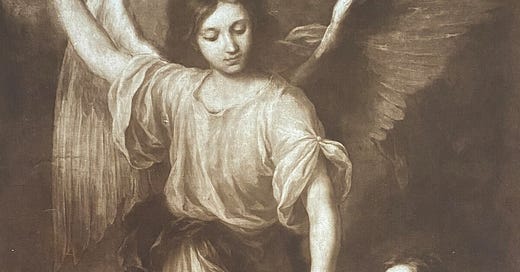On an engraving after Murillo’s Guardian Angel
A poem, written by Eliza Ogilvy in 1846, in appreciation of Murillo's ability to render children and childhood, at a moment when Spanish art entered the Anglo Scottish imagination.
Eliza’s poem (below) was written in 1846 but not published until 1856 in her anthology Poems of Ten Years (1846-1855). Bartolomé Esteban Murillo was little known in Britain at the time, although in the Eighteenth Century his work had been a revelation to English artists including Gainsborough and Reynolds. Murillo relied for his living on aristocratic and religious commissions but unusually, for a 16th Century artist, he also painted working people and street urchins in everyday situations and developed a very natural style of depicting children, which would have been especially appealing to Eliza; and this particular image, child with angel, would have conjured thoughts of Rose, her first daughter, who had died in the previous year. Murillo made these works for his own pleasure but found a market with Flemish merchants, and this was the route along which a few had reached London by the 1690s. As to how Eliza came to know his work, she lived in London from 1843-48 and may have seen the 13 Murillos on display at the Dulwich Picture Gallery, part of the Bourgeois bequest of 1810; there were another 12 at Apsley House, after a gift of 165 Spanish works was made by Ferdinand VII to the Duke of Welllington.
The Guardian Angel was a religious commission and remains in Seville Cathedral; it was painted by Murillo for the Convent of the Capuchins in Seville in around 1665. In 1814 the painting was given to the Cathedral Chapter in thanks for its removal to Gibraltar during the Napoleonic wars, to protect it from plundering by the French. It is more than likely that Eliza would have seen the engraving as a result of her friendship with William Sterling of Keir, who in 1847 produced the first scholarly work on Spanish art in the English language, Annals of the Artists of Spain. See Introducing Eliza Ogilvy. The poem makes Eliza’s admiration for Murillo clear in the penultimate stanza: ‘Great heart, great intellect endowed // Murillo, thee, whose vision stretched … By those high aims which sanctified thy touch // With part of childhood's purity in loving it so much’. The engraving illustrated above is a good one, but made some years after Eliza’s poem, possibly copied from a photograph by James Anderson who specialised in reproductions of works of art and was based in Rome (as per the caption).
On an engraving after Murillo’s Guardian Angel'
I know thee, child, of earthly make,
That joumeyest at the angel's side,
By orbs with wonder opened wide
Where hopes celestial newly wake,
By lips with richest carmine dyed
Whereon such eager questions shake,
By bearing meek and forehead calm
And hand laid in the angel's palm
I know thee, child, of earthly make.
A beauteous and a holy thing
Is childhood unto him who sees
Far down through life's deep mysteries
The shadow of the angel's wing
Doth visibly to such a gaze
Encanopy the infant's face,
The pressure of the angel's hold
The tiny trusting hand enfold,
As visibly as on this page
That doth pourtray a seraph's ambassage.
I know thee, child, of earth created,
Because I see thy fluttering soul
Cannot escape the flesh control,
But through the lattice of thine eyes
Yearns vainly toward the distant skies.
O hasty boy, that hast not waited
For kin or friend or playmate young
But at the first word risen and sprung !
Darkness behind thee veils the globe :
Cling closer, child, unto the robe
Of thy seraphic messenger,
And undisturbed pursue afar
That heaven-directed nearing star
To which his fingers point
Its rays already thee anoint
While thy few doubts thou dost commit
With childhood's quick instinctive wit
For counsel to that placid mien,
Those fearless eyes and brow serene :
How should such doubts possess thy thought ?
One single accent of his speech
Which human lips could never reach
With certainty of joy, with perfect peace is fraught.
O boy, in beauty thy compeer,
Offspring of same unrivalled hand,
And drawing too his image clear
From olive babes of Spanish land
How like yet most unlike to thee
That Child Divine whom I have seen
With mild and melancholy mien
Upon his virgin mother's knee
His eyes reciprocal to hers,
Brown and transparent as a pool
That keeps its tranquil waters cool
Moss-fed beneath the mountain firs,
Which solemnize the noonday beam
Falling refracted on the stream.
Great heart, great intellect endowed,
Murillo, thee, whose vision stretched
Over all childhood, and thence fetched
Far differing attributes,—not disallowed
By those high aims which sanctified thy touch
With part of childhood's purity in loving it so much.
Its loftiest secrets hast thou dared explore
When to the God thou didst aspire ;
Thy canvass shows Him child for evermore
Upon His mother's lap ascending to his Sire.
And from that Infant Deity how low
Thy pencil slid down to this creature frail
Whose timid footsteps humbly trail
After the angels as they go
This babe who onward to the morrow
Impatient eyes the starry rays,
And that sad retrospective gaze
Turned upon man and sin and sorrow :
This, with its human hope and trust —
That, from His triumph throne pitying our mortal dust.




